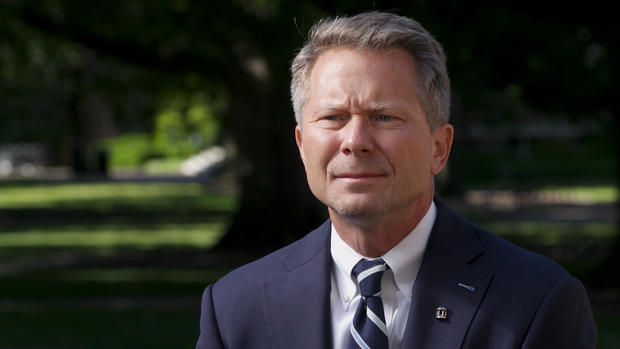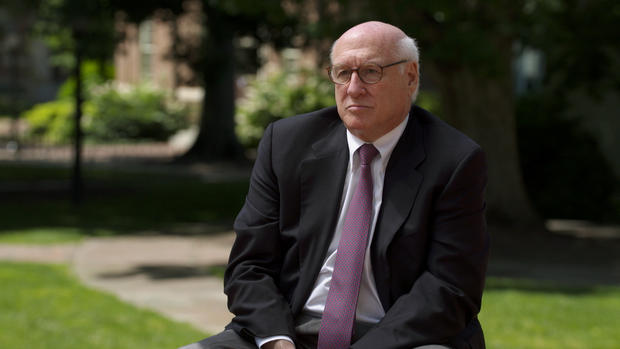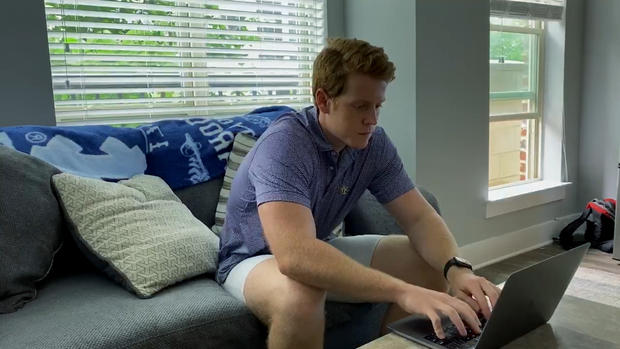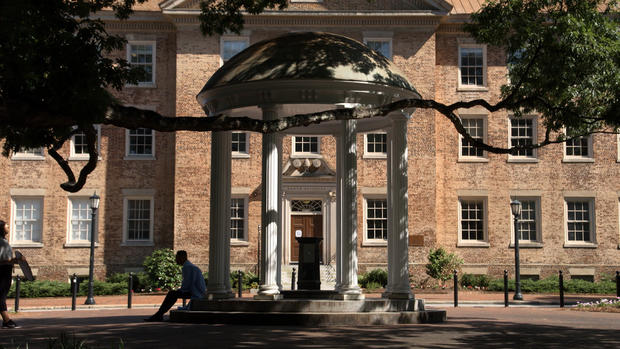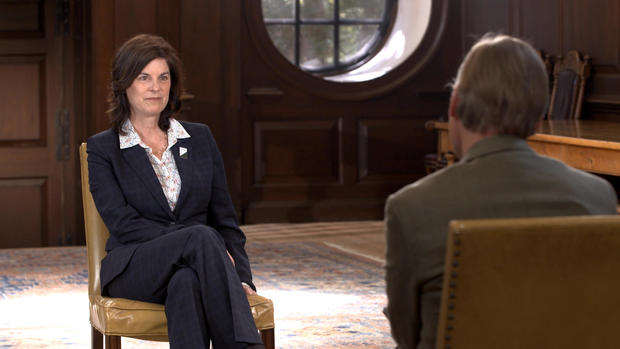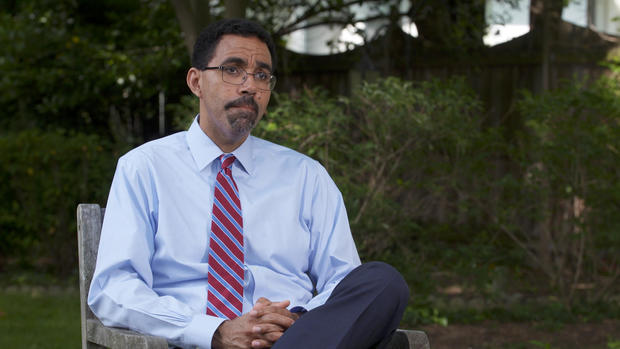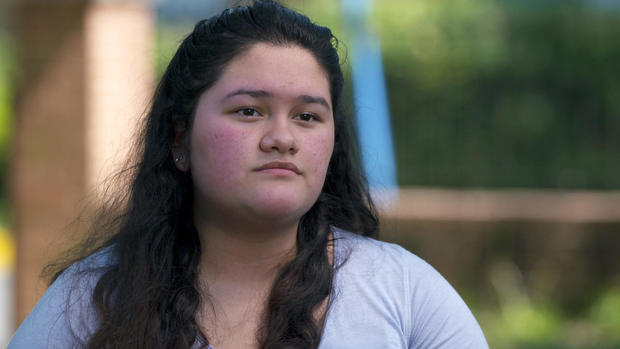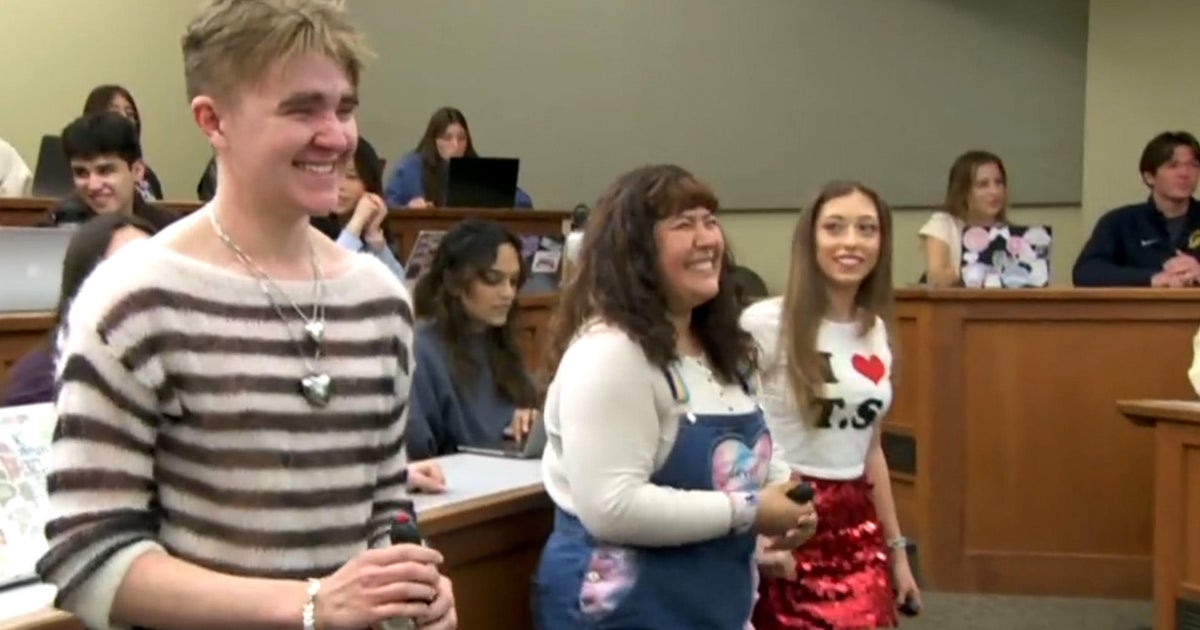Colleges and universities prepare for fall classes in the middle of the coronavirus pandemic
This fall, college will start with a test. Can America's universities reopen during the greatest pandemic in a hundred years? Some universities are remaining online, others are still unsure, but a growing number are preparing for perhaps the largest coordinated return institutions have made since the virus hit. In many ways, colleges and universities are the perfect places for an American reawakening. Scientists can track and trace, behavioral experts can make the pitch and philosophers can explain the balance between collective good and the individual. But, we go to college to be social, with no distance. College students are going to have to step up by staying apart. If they do, they may lead the way not just for the next semester, but for the entire country and its future.
In 1795, the University of North Carolina at Chapel Hill became the first public university in America to open its doors to students, but since this past March those doors have been shut. In August the silence on campus will be lifted. Though the pandemic persists, the university was among the first schools to announce a plan to bring its 40,000 students, faculty and staff back to campus for in-person classes. Kevin Guskiewicz is UNC's chancellor.
John Dickerson: What are you hearing from students about coming back in the fall?
Kevin Guskiewicz: They're excited about the opportunity to come back, knowing though that it's not gonna be the same Carolina…
John Dickerson: Is it worth the risk then, to bring everybody back, if it's not gonna be the same Carolina?
Kevin Guskiewicz: We're not gonna bring students, faculty, staff back onto a campus where we don't believe it's a safe environment. There certainly is some risk, but we believe we're putting in place the right measures to mitigate that risk.
Those measures include starting the fall semester early. In seven weeks, students will begin the familiar ritual of moving into dorms, final exams will end just before Thanksgiving, and then students will be sent home through at least the new year.
Kevin Guskiewicz: We're trying to stay ahead of the potential second wave of the virus, which the experts think that if we're gonna see that, it's likely to happen in late November, December.
To reduce density, lecture classes will be downsized. Disinfecting is happening in the athletic facilities, the dormitories and classrooms. To help design its reopening, the school turned to Dr. Myron Cohen, the director of UNC's institute for global health and infectious diseases.
John Dickerson: How important are masks?
Dr. Myron Cohen: Masks, masks and more masks. You, you can't say enough about masks.
John Dickerson: What is the mask rule?
Dr. Myron Cohen: We require that the students in the classroom will wear a mask, that the professor will be some distance away from the students and the professor will wear a mask. So we intend our classrooms to be 100% masked.
John Dickerson: How do you teach a class with a mask on?
Dr. Myron Cohen: Well, we're gonna figure that out pretty quickly. But I think I can put my mask on and we can continue the interview. And we can see how it goes. It's not impossible.
What may be impossible is preventing students from gathering in dorms, college-age kids are wired to socialize. They mark the time by the big celebrations, like one after North Carolina's national championship in basketball three years ago.
John Dickerson: How leaky, for lack of a better word, is…
Dr. Myron Cohen: It's a good word.
John Dickerson: …the campus environment, how many threats to your system are there?
Dr. Myron Cohen: Oh, it's-- it's completely leaky. The students can go anywhere they'd like to go. And the most important thing is the leakiness matters less, under two conditions. We reduce the density. That is, we do not allow large numbers of people congregating and masks.
John Dickerson: I can't think of a more difficult cohort than college students to tell, 'Don't congregate.' Isn't the whole reason they're being brought back here, to congregate?
Dr. Myron Cohen: Well, I guess we're going to have to see…
John Dickerson: Because it feels like you're one keg party away from a bad problem…
Dr. Myron Cohen: The entire campus will be trying to create environments where people are incredibly socially responsible. Humans are smart. Okay, these students are smart.
Reeves Moseley, a rising senior from Texas, is UNC's student body president.
Reeves Moseley: We have to grow up a little faster than we would otherwise and be able to say, 'This is a new community standard that we have to set.' This is unprecedented, but we have to rely on the social pressure for students to wear masks, to social distance.
The university acknowledges there will be cases. The challenge will be catching them before a larger spread occurs. Two dormitories will be set aside to quarantine students.
Kevin Guskiewicz: We'll look for clusters. If there was a cluster of positive cases that that would potentially create an off ramp for us and we could pivot back to an remote learning environment.
Many schools around the country are still working on their specific plans for the fall that must now include how to handle almost certain protests against racism.
Due to the pandemic, the California State University system announced last month courses will be taught primarily online in the fall. For UNC's Reeves Moseley, remote learning this spring led to a sense of isolation and a loss of community.
John Dickerson: If they had said, 'you're gonna have to do online learning for one more semester,' how many of your fellow students would have said, 'I'm not gonna do that' or their parents woulda said, 'I'm not gonna pay for that.'
Reeves Moseley: A lot. You know, you're paying these tuition dollars. And if you're having an online instruction experience, that's nowhere like the actual experience you'd be having otherwise.
For UNC's chancellor, Kevin Guskiewicz, that's another reason to reopen.
John Dickerson: And I just wonder if it would've been financially infeasible to not reopen?
Kevin Guskiewicz: We would've been challenged financially to not reopen. We-- we know that many students would've perhaps taken a gap year or to defer their enrollment. But I want to emphasize that our decisions are based on creating that learning environment for students, where we know they can thrive and building in all of these measures for safety.
College in the fall is a time of renewal. A return to fields of possibility, a place where your route to the future is visible. At William & Mary in Virginia, the school year is launched with a traditional raucous welcome of new students. In the middle of it all the past two years has been the university's first female president, Katherine Rowe.
John Dickerson: Have you already started writing the speech for when they return?
Katherine Rowe: Oh, I'm thinking about it all the time (laughs). I miss them so much.
We spoke to President Rowe in the oldest building on any american campus. At the 327-year-old school that educated three u.S. Presidents, rowe and her husband are now the only people living on campus…she walks daily past the empty halls and dorms, burdened by what's ahead.
John Dickerson: What causes the most weight to that burden?
Katherine Rowe: One weight comes from, sheerly from uncertainty. Human beings loathe it. We will do almost anything not to have it. And we are called to tolerate uncertainty at a really high level right now.
After a marathon of Zoom calls, William & Mary announced Friday it too will return early to in-person classes. But students will have the flexibility to finish the school year through next summer.
Katherine Rowe: It's helpful to know that we've survived enormous shocks in the past and to think about what it took to persevere. That's incredibly encouraging.
Twice before in its long history, William & Mary shut down: during the Civil War and during a late 19th-century financial crisis. This pandemic and its economic impact may present the biggest challenges to the school in over a century.
John Dickerson: How many students do you think won't be able to come here because of the economic devastation?
Katherine Rowe: I think that's one of the questions that is most concerning and that we still don't know the answer to. If you think about 40 million people in the country out of work – some of them will be parents of our students.
John Dickerson: Some people worry about a lost generation.
Katherine Rowe: We have an obligation to ensure that this cohort of students doesn't lose speed, doesn't lose momentum in their college educations.
John Dickerson: What would happen if the students lost that speed?
Katherine Rowe: It's really hard to imagine accepting that as a possible path forward. We can't. So however we have a year next year, we will have a year. However they learn, we will make it possible for them to learn.
Three quarters of college students attend public institutions, which are reliant on state funding.
John King: What's coming is that states are seeing huge drops in revenue that will translate into a big hit to public higher education. And if we see huge cuts to public higher ed, that'll mean less financial aid for students.
John King served as the secretary of education in the Obama administration and is now the CEO and president of The Education Trust, a non-profit that works with underserved students he worries will be hurt the most. Budget cuts could cripple institutions like those in the City University of New York system, known as CUNY.
John King: I think a lot about CUNY partly because it's such a powerful engine of social mobility today and has been for generations, generations of low-income folks, generations of immigrants who through CUNY have gotten access to the American dream.
John Dickerson: This is not just about the next semester of college? This is about the next phase in the economy?
John King: Absolutely. We-- as we've moved towards an information economy, the future jobs that will provide a good family sustaining wage are jobs that require college degrees. We know that earning a college degree adds a million dollars in lifetime earnings.
John Dickerson: And if three quarters of college students are going to state institutions and those are feeling particular pressure, this economic challenge for colleges exacerbates the existing economic challenges in the American workforce?
John King: If we make cuts to higher education now, if we undermine public higher ed as a driver of economic opportunity we will hurt the economy five, ten, 15 years out.
The incoming freshmen this fall, the high school class of 2020, were denied the pleasure of breaking the tape at the end of a long marathon. Lawn signs replaced graduation day.
There were a few innovative ceremonies, Clover High in South Carolina rented out Hound's Drive-In Theater to hand out diplomas to departing seniors, some of whom will be entering an uncertain collegiate landscape. And the struggle extends to those already in college who are laboring to pay tuition and are weighed down by debt like 20-year-old Katherine Trejo of Arlington, Virginia. The daughter of a single mom from Bolivia, Katherine was supposed to graduate from George Mason next year. She is the first person in her family to attend college.
John Dickerson: Was it always the expectation that you would go to college?
Katherine Trejo: Yes. My mom wants-- wanted me to begin reading law books when I was in fourth grade. Obviously, I…
John Dickerson: Fourth grade?
Katherine Trejo: Yes. She wanted, she's been pushing me to be a lawyer since I was in the fourth grade.
But katherine lost her two jobs this spring that helped her finance her tuition and support her family, she has no health insurance and has $11,000 in student debt.
John Dickerson: So right now, you won't be going back in the fall?
Katherine Trejo: As it stands, no.
John Dickerson: So with everything you're facing, COVID still going on, the economy has hit your family really hard, that dream that you've been talking about for yourself and your family, do you feel like that's slipping away?
Katherine Trejo: Yeah. Um, I worry about it every day. Just sometimes I get really overwhelmed and I do feel like the dream is slipping away.
John Dickerson: What would happen if you didn't graduate from college?
Katherine Trejo: That's not an option. It's just not an option. I value education a lot, and whether it'll take me five years or another ten years to get it, but it's just not an option to not go back.
That is the kind of determination that spurs universities to reopen. And when the COVID-19 challenge is over, schools will return to the previous test they faced: finding a way to make education available to enough students so that America can still be called the land of opportunity.
Produced by Draggan Mihailovich. Associate producer, Jacqueline Williams. Broadcast associate, Claire Fahy. Edited by Warren Lustig.
